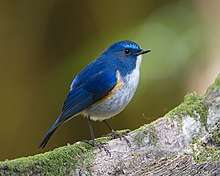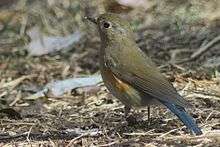Himalayan bluetail
The Himalayan bluetail or Himalayan red-flanked bush-robin also called the Orange-flanked bush-robin[3] (Tarsiger rufilatus) is a small passerine bird that was formerly classed as a member of the thrush family Turdidae, but is now more generally considered to be an Old World flycatcher of Muscicapidae. While currently under review, this taxon is not current recognized as a species by BirdLife international.[4]
| Himalayan bluetail | |
|---|---|
 | |
| Male at the summit of Doi Inthanon, Thailand | |
| Scientific classification | |
| Kingdom: | Animalia |
| Phylum: | Chordata |
| Class: | Aves |
| Order: | Passeriformes |
| Family: | Muscicapidae |
| Genus: | Tarsiger |
| Species: | T. rufilatus |
| Binomial name | |
| Tarsiger rufilatus (Hodgson, 1845) | |
| Synonyms[2] | |
|
Tarsiger cyanurus rufilatus
| |

It is closely related to the red-flanked bluetail and was generally treated as a subspecies of it in the past, but as well as differing in its migratory behaviour (the red-flanked bluetail is a long-distance migrant), it also differs in the more intense blue colour of the adult males and the greyer colour of the females and juveniles.[5][6]
Description and distribution
The Himalayan bluetail is a short-distance altitudinal migrant species, breeding in the Himalaya in bush layer (dwarf rhododendron in wetter areas, deciduous bushes in drier) of conifer and mixed conifer-oak forest, main species fir (Abies) but sometimes in areas with Picea smithiana or Pinus wallichiana/Cupressus torulosa forest; at 3000–4400 m, not penetrating beyond tree-line and in winters found at 1,500–2,500 m typically in broadleaf evergreen forest, dense dark undergrowth and thickets, clearings, treefall gaps with vine tangles, open woodland; commonly seen along tracks; favours ridges and mountain tops.[7][8] It is insectivorous.
References
- BirdLife International. "Tarsiger rufilatus (Himalayan Bluetail, Himalayan Bush-robin)". IUCN Red List of Threatened Species. Retrieved 13 February 2018.
- "Tarsiger rufilatus". Avibase.
- Grimmett, Richard; Inskipp, Tim (2003). Birds of Northern India. New Delhi: Oxford University Press. pp. 202–203. ISBN 0195668286.
- BirdLife species factsheet for Tarsiger rufilatus
- Hoyo, J. del, et al., eds. (2005). Handbook of the Birds of the World, vol. 10. Barcelona: Lynx Edicions. p. 754. ISBN 84-87334-72-5.CS1 maint: extra text: authors list (link)
- Rasmussen, P. C., & Anderton, J. C. (2005). Birds of South Asia: the Ripley Guide. Barcelona, Spain: Lynx Edicions. ISBN 84-87334-67-9.
- "Orange-flanked Bush-robin (Tarsiger cyanurus)". hbw.com. Retrieved 2017-01-12.
- Collar, N. & de Juana, E. (2017). Orange-flanked Bush-robin (Tarsiger cyanurus). In: del Hoyo, J., Elliott, A., Sargatal, J., Christie, D.A. & de Juana, E. (eds.). Handbook of the Birds of the World Alive. Lynx Edicions, Barcelona.
